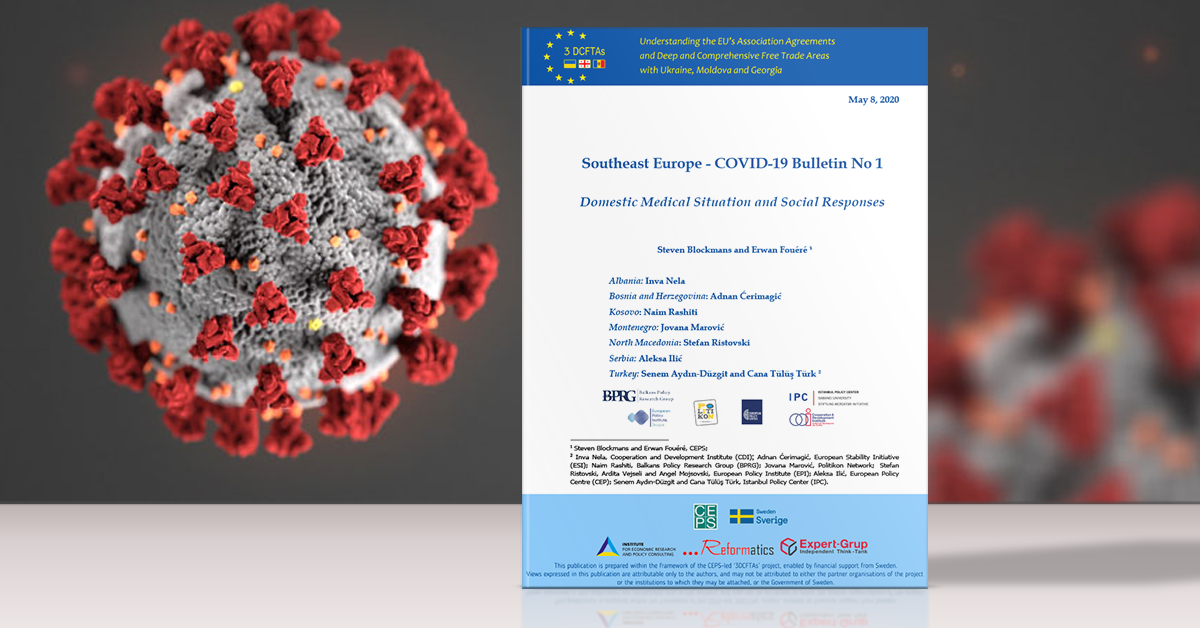While the European Union has become the epicentre of the global Covid-19 crisis, the countries of the Western Balkans – Albania, Bosnia and Herzegovina, Kosovo, Montenegro, North Macedonia and Serbia – have so far remained remarkably lightly affected. Even neighbouring Turkey, although having a high number of confirmed cases, has so far counted far fewer deaths than many West European countries. This is in spite of the fact that all countries of Southeast Europe (SEE) have large diasporas in the EU, with large numbers of cross-border family links and movements.
It is evident that all seven states have taken substantial and early measures to curb infections, in some cases even before the most affected EU member states. However, interpretation of the data is going to require more time to pass. Caution is certainly due with regard to the overall low infection rates, which are influenced by low testing. The very low death rates in some Western Balkan countries could also be due to misclassifications in statistical presentation.
Notwithstanding these cautions and despite the variations across the region, the seven SEE countries may yet prove to have been relatively successful in minimizing the direct medical incidence of Covid-19.
- Infection rate and testing capacity: According to the available statistics of confirmed cases, all countries seem to have passed the peak, with the numbers of infections and deaths declining gradually. With one or two exceptions, testing remains limited, often due to lack of capacity and relevant testing equipment.
- Healthcare systems: Overall the countries have been coping well, despite some initial teething problems. However, with one or two exceptions (e.g. Serbia), 3 most experienced shortages in medical equipment in particular the personal protection equipment required to deal with patients.
- Preventive measures: Throughout the region, with the possible exception of Turkey and Montenegro, strict lockdown measures and fixed time curfews were installed at an early stage. Turkey imposed more flexible measures, which was the subject of criticism internally, while Montenegro imposed only limited curfews and did not declare a state of emergency. With the decrease in infection rates, most countries have now started easing some of the restrictions. So far, expert bodies like national centres for disease control have played an important role in communicating the preventive measures to the public (e.g. Albania).
- Compensatory measures: Despite difficult economic circumstances to begin with, all countries adopted some form of temporary compensatory measures. These focused mainly on easing tax burdens, moratorium on loan repayments and bankruptcy proceedings as well as support for small and medium-sized enterprises (cf. North Macedonia).
- Impact: For all countries, the economic impact has already been felt with varying degrees of severity. For those with already high unemployment or poverty rates, such as Kosovo, the impact has been even greater. Of particular concern is the high number employed in the informal sector, most of whom are excluded from the compensatory measures and will thus be hit hardest.
- Mood of the population: The public have been generally supportive of the measures taken by the respective governments, despite some violations of curfews.
The cases of discontent related in particular to the restrictions imposed on the Orthodox Easter ceremonies, while mistrust towards governments over cases of alleged corruption (e.g. Bosnia and Herzegovina), as well as in the manner of reporting cases of Covid-19 (e.g. Turkey) or ‘personalised’ lockdown measures (e.g. Montenegro) also arose.
In the ‘Zagreb Declaration’ of their virtual summit of 6 May 2020, the EU reiterated its strong solidarity with its Western Balkan partners in the context of the Covid-19 crisis and the intention to actively support their efforts to fight the coronavirus outbreak and its impacts on societies and economies. As outlined in the Commission Communication of 29 April the EU has mobilised a package of over EUR 3.3 billion to support to the Western Balkans in tackling Covid-19 and the post-pandemic recovery. This includes:
- the immediate delivery of essential supplies to save lives, such as material to check the correct functioning of coronavirus tests;
- joint procurement and the unrestricted trade-flow of protective personal equipment, through so-called ‘green lanes’ linking the EU and Western Balkans;
- cooperation between relevant health bodies;
- support for the social and economic recovery needs through a EUR 750 million package of macro-financial assistance and a EUR 1.7 billion package of assistance from the European Investment Bank.
In the past few weeks, EU officials have openly complained about the fact that this support and cooperation goes far beyond what any other partner has provided to the region and deserves public acknowledgement. At the same time, the Zagreb Declaration recognises the valuable support the Western Balkans have given during the pandemic to their immediate neighbours and towards the EU. This, indeed, reflects the solidarity and mutual support the EU is built on. In this Bulletin we present comparative summaries of the situation in each of the SEE countries. These Bulletins will be continued fortnightly, each organised around a central theme. In this first edition, we take stock of the domestic medical situation and the social response to the coronavirus outbreak. Read the full bulletin here.
This publication is prepared within the framework of the CEPS-led ‘3dCFTAs’ project, enabled by financial support from Sweden.

